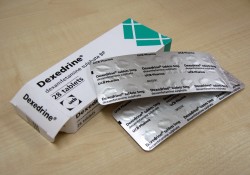
Dexedrine, one of two brand name drugs for dextroamphetamine, is a prescription stimulant medication. Prescription stimulants in general, speed up brain and central nervous system processes for anywhere from eight to 24 hours at a time.
Commonly prescribed to treat conditions involving ADHD and narcolepsy, Dexedrine works to correct for the brain chemical imbalances that cause these conditions, according to the U. S. Food & Drug Administration. In cases of Dexedrine abuse, the drug’s effects quickly spiral out of control as the drug takes over brain chemical functions. Over time, Dexedrine abuse practices cause widespread deterioration of major bodily systems leaving users helplessly addicted to the drug’s effects.
Brain Cell Damage from Dexedrine Abuse
Dexedrine works by triggering the release of neurotransmitter chemicals from specific brain cell receptor sites. Stimulants in general can interact with the brain in much the same way as the brain’s own chemicals, which accounts for the dangers associated with Dexedrine abuse.
With prolonged drug use, brain cells start to undergo structural damage from having to secrete unusually large amounts of neurotransmitters on a frequent basis. This damage sets the stage for the Dexedrine abuse/addiction cycle to take root.
Damaged brain cells also require larger doses of Dexedrine over time in order to produce the desired high effects of the drug. These changes drive users to engage in bingeing behaviors, which entail consuming large amounts of the drug in rapid succession. This practice only works to speed up the rate of brain cell damage.
Psychosis

Dexedrine abuse can cause damage to brain cells.
The ongoing cell deterioration brought on by Dexedrine abuse creates rampant chemical imbalances throughout the brain and central nervous system. Over time, these brain chemical imbalances start to interfere with a person’s psychological stability in drastic ways.
Long-term Dexedrine abuse can bring on a condition known as amphetamine psychosis where users experience psychotic episodes on a recurrent basis. The longer a person continues to use the longer these episodes last. After a certain point, stress alone can trigger a psychotic break once amphetamine psychosis has set in.
Health Problems
People who abuse Dexedrine on a frequent basis open themselves up to any number of health complications as central nervous system functions start to break down over time. In effect, any bodily system regulated by the central nervous system remains vulnerable to Dexedrine’s harmful effects.
Health problems commonly associated with frequent Dexedrine use include:
- Respiratory ailments
- Skin conditions
- Vitamin deficiencies
- Movement/coordination impairments
- Fatigue
- Ulcers
- Irregular heartbeat
Addiction
Once a physical dependency on Dexedrine takes hold, it’s only a matter of time before users develop a psychological dependency on the drug. Psychological dependency takes root within the brain’s reward system, which relies on a certain balance of neurotransmitter chemicals to function normally. This area of the brain regulates a person’s motivations, learning and priorities.
The chemical imbalances brought on by Dexedrine abuse warp brain reward system functions to the point where the drug takes on top priority in a person’s life. At this point, a person’s daily routines, priorities and motivations all center on getting and using the drug.


